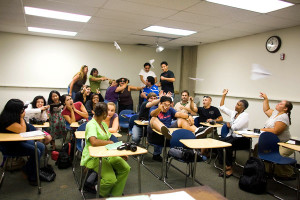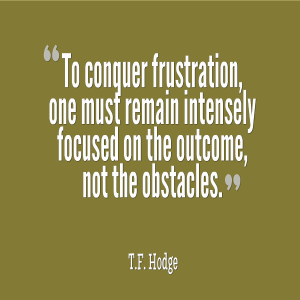 For the past two weeks I have been blogging about classroom management for librarians. Part three of this discussion is the hardest challenge –handling disruptive students and classes. There is no silver bullet. No quick fix. And nothing works perfectly every time. But there are some things to help guide you through these tough situations. Being prepared. Having thought through possible scenarios and your response to them. If you have instilled a climate of respect in the library, instituted guiding routines, and don’t try to impose control over the environment, these flare-ups will be rare. How you manage them to some extent depends on the grade level of the students and, of course, whether it’s the entire class or just one.
For the past two weeks I have been blogging about classroom management for librarians. Part three of this discussion is the hardest challenge –handling disruptive students and classes. There is no silver bullet. No quick fix. And nothing works perfectly every time. But there are some things to help guide you through these tough situations. Being prepared. Having thought through possible scenarios and your response to them. If you have instilled a climate of respect in the library, instituted guiding routines, and don’t try to impose control over the environment, these flare-ups will be rare. How you manage them to some extent depends on the grade level of the students and, of course, whether it’s the entire class or just one.
At the elementary level, if a teacher drops off a class and departs before students have entered, they might become rowdy, particularly if it was a substitute (see similar situations at the high school). Depending on the layout of your library, you can forestall chaos by placing yourself in front of the lead student. Say, “Freeze.” Then ask, “Who remembers what you do first when coming into the library?” The question triggers not only your established routines but also a classroom environment. Give them a clue as to what they will doing with you and then let the class progress as usual.
 When one student repeatedly disrupt a lesson, most alternatives that first occur to you are equally bad. Ignoring the student challenges him or her to continue the behavior more frequently. Stopping the lesson to admonish the child gives the desired negative attention. Sending the student to another section as a “time-out” usually puts him/her out of your view and can lead to further issues. So – what’s a good choice? Ask a question of that child based on what you are doing. If he/she can’t answer, have another student help, but then say to the disruptive one, “I know you could have answered that. You can make good contributions here, even if it’s been a bad day for you.” What you have quietly communicated is that you recognize the child is angry and frustrated over something that has nothing to do with you (unless you have been actively disrespectful to the student), and has no way to get it out.
When one student repeatedly disrupt a lesson, most alternatives that first occur to you are equally bad. Ignoring the student challenges him or her to continue the behavior more frequently. Stopping the lesson to admonish the child gives the desired negative attention. Sending the student to another section as a “time-out” usually puts him/her out of your view and can lead to further issues. So – what’s a good choice? Ask a question of that child based on what you are doing. If he/she can’t answer, have another student help, but then say to the disruptive one, “I know you could have answered that. You can make good contributions here, even if it’s been a bad day for you.” What you have quietly communicated is that you recognize the child is angry and frustrated over something that has nothing to do with you (unless you have been actively disrespectful to the student), and has no way to get it out.
The recognition that the disruptive behavior is not connected to you holds true when dealing with students at upper grades as well. Don’t take it personally. Try to see it from the child’s viewpoint. Has s/he been harassed by other students or by the previous teacher? Made to feel stupid and/or humiliated, or is dealing with an upset from home? There is no outlet for the emotional turmoil. Students know the teacher has the power and there is little they can do but become a major annoyance to get back at those in charge. When possible at the upper grades, go over to the student and say, “I am guessing you are having a terrible day. Do you want to get a drink of water, look at a magazine, or go on the computer for a bit?” Understanding and respect go far.
Disruptive, out-of-control classes are a different challenge at middle and high school because the teacher is present. On the one hand you don’t want to usurp the teacher’s authority. On the other hand, this is your space and you are responsible for it. It’s easier when the situation is triggered by a substitute bringing the class in. You can simply say to the teacher, “It’s tough for subs to bring classes to the library. I’ll take care of it.” Then calm the class down by reminding them they have limited time to get their assignment done.
When they are with their regular teacher, you need to move more diplomatically. Ask the teacher whether she would prefer to get the class settled or would he/she rather you do it. Don’t say, “Get your students under control, they are disrupting the work of others.” You are always working to build positive relationships.
 It is tempting sometime to send a student to the principal but that should be reserved for the direst situations. You don’t want to get a reputation for not being able to maintain discipline in the library. Call security or the office when violence is a possibility. Otherwise, try to avoid that response.
It is tempting sometime to send a student to the principal but that should be reserved for the direst situations. You don’t want to get a reputation for not being able to maintain discipline in the library. Call security or the office when violence is a possibility. Otherwise, try to avoid that response.
I am sure you can come up with many other scenarios where you struggled to restore order. That’s the idea. Review the ones you have dealt with. What could you have done differently? Doing mental rehearsing will keep you one step ahead of students. Most of the time. And remember – in general there are no “bad” kids or classes. Only situations to be managed. You can do it.
